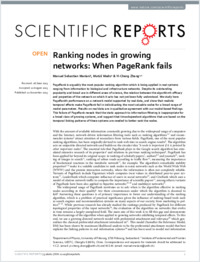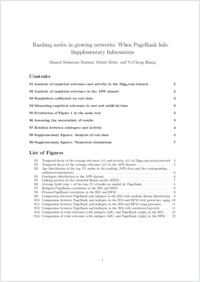Ranking nodes in growing networks: When PageRank fails
- Mariani, Manuel Sebastian Department of Physics, University of Fribourg, Switzerland
- Medo, Matúš Department of Physics, University of Fribourg, Switzerland
- Zhang, Yi-Cheng Department of Physics, University of Fribourg, Switzerland - Institute of Fundamental and Frontier Sciences, UESTC, Chengdu, China
-
10.11.2015
Published in:
- Scientific Reports. - 2015, vol. 5, p. 16181
English
PageRank is arguably the most popular ranking algorithm which is being applied in real systems ranging from information to biological and infrastructure networks. Despite its outstanding popularity and broad use in different areas of science, the relation between the algorithm’s efficacy and properties of the network on which it acts has not yet been fully understood. We study here PageRank’s performance on a network model supported by real data, and show that realistic temporal effects make PageRank fail in individuating the most valuable nodes for a broad range of model parameters. Results on real data are in qualitative agreement with our model-based findings. This failure of PageRank reveals that the static approach to information filtering is inappropriate for a broad class of growing systems, and suggest that time-dependent algorithms that are based on the temporal linking patterns of these systems are needed to better rank the nodes.
- Faculty
- Faculté des sciences et de médecine
- Department
- Département de Physique
- Language
-
- English
- Classification
- Physics
- License
-
License undefined
- Identifiers
-
- RERO DOC 258071
- DOI 10.1038/srep16181
- Persistent URL
- https://folia.unifr.ch/unifr/documents/304699
Other files
Statistics
Document views: 112
File downloads:
- pdf: 224
- Supplementary material: 157

